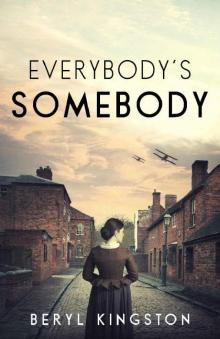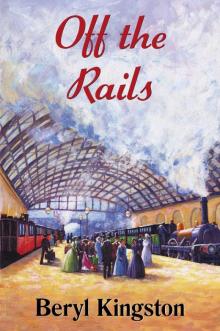- Home
- Beryl Kingston
A Time to Love
A Time to Love Read online
A Time To Love
Beryl Kingston
To R.D. and our family
To everything there is a season
and a time to every purpose under heaven
A time to love and a time to hate;
A time of war and a time of peace.
Ecclesiastes
Contents
Chapter One
Chapter Two
Chapter Three
Chapter Four
Chapter Five
Chapter Six
Chapter Seven
Chapter Eight
Chapter Nine
Chapter Ten
Chapter Eleven
Chapter Twelve
Chapter Thirteen
Chapter Fourteen
Chapter Fifteen
Chapter Sixteen
Chapter Seventeen
Chapter Eighteen
Chapter Nineteen
Chapter Twenty
Chapter Twenty-One
Chapter Twenty-Two
Chapter Twenty-Three
Chapter Twenty-Four
Chapter Twenty-Five
Chapter Twenty-Six
Chapter Twenty-Seven
Chapter Twenty-Eight
Chapter Twenty-Nine
Chapter Thirty
Chapter Thirty-One
Chapter Thirty-Two
Chapter Thirty-Three
Chapter Thirty-Four
Chapter Thirty-Five
Chapter Thirty-Six
Chapter Thirty-Seven
Chapter Thirty-Eight
Chapter Thirty-Nine
A Note on the Author
Chapter One
It was 1886 and the coldest February in London for thirty years. Snow fell remorselessly, day after shivering day, so that roofs were perpetually white with it, although the streets below were soon smeared and discoloured and ridged with frozen slush. In the dark alleys of the East End the usual mounds of horse dung, rotten fruit, decomposing vegetables and discarded ash had been embedded in ice for such a very long time that they had acquired the familiarity of permanence, and in the West End it was impossible to keep the pavements clear before the fashionable frontages of Bond Street and Piccadilly even with a willing army of underpaid unemployed to do the work. On many days a narrow pathway was all they could manage and even that was furred with snow again as soon as the ragged shovellers had moved on into the next street.
Above the dazzle of that white roofscape the sky was a dirty grey like unwashed underwear and the air it pressed down upon the inhabitants was so cold it bit their lungs. All outdoor work had been frozen to a halt at the start of the year, and now the unemployed were in a desperate state. Nobody who could avoid it stayed out of doors for long. The poor huddled beside their inadequate stoves and the rich built fires in every room. Between the blue-white of the snow and the grey-white of the sky, plumes of smoke rose from a million chimneys, thick and suffocating and in every shade of grey and brown and yellow, from slate to sulphur.
The river coiling between north and south of the powdered city was sluggish and sullen and looked curiously exposed, the few boats struggling in its chill waters black in the feeble light of a colourless sun. In the quieter reaches above London Bridge ice floes drifted on the surface of the water and knocked against each other with an eerily hollow reverberation. It was an eldritch city, a city bewitched, a city under a curse.
To Emmanuel Cheifitz, tailor and master cutter, in his one bleak room in Wilson Place down in the unfed tenements of Whitechapel, the intense cold was just the most recent in a long series of miseries and misfortunes, so frequent and persistent that, had it not been for the fact that his new wife Rachel was expecting their first child, he really felt he was almost immune to them. Despite his poverty, or perhaps because of it, he was an excessively proud man, and took a perverse satisfaction from the fact that whatever vicissitudes God might have in mind for him, he could endure without complaint. For was He not an inscrutable God, of infinite wisdom, and was it not His high purpose to test His chosen ones in the fires of pain and persecution?
So he ignored the ache of hunger in his contracted belly and the stabbing fire of chilblains on his fingers and toes, and when he could find work he worked, and when he couldn’t he did his best to cheer his neighbours. And from time to time when he needed comfort for himself he would play cards and gamble a little, Pontoon or Solo usually, and only for farthings, or ha’pennies, when the tailoring was paying better. But it was enough. It gave him excitement and a taste of hope and a sense that life could be enjoyable.
He was a gentle man and had a scholarly air about him, being tall and gangly with long thin hands and narrow feet. He wore the long black coat of the orthodox Jew, and the flat-brimmed black hat that he’d brought with him from Warsaw when he was fourteen, because it belonged to his father and his father was dead. His hair was limp and thin and mouse brown, and his beard was straggly and inadequate, but between them his face had character, with a long straight nose and high cheekbones and blue eyes capable of many expressions, tolerance, patience, a gamut of passions, and even an occasional flash of sardonic humour. It was a strong face, a face that knew how to endure.
But then, as if extreme cold were not punishment enough to test even the most devout, his inscrutable God sent him two further hardships. First his job disappeared altogether, then he received notice that he had three weeks in which to find other accommodation, because all the houses in the immediate area of Flower and Dean Street were going to be demolished as part of a slum clearance scheme. Now, just when he needed money for his new child, and money for food, and money for coal, and key money for another room, he was down to his last shilling.
The tailoring trade always went into decline after Christmas, when there was less money around and less demand for new clothes, but this year the decline had become a stoppage. Little work became less, and less, until finally in the first cold week of February there was no work at all, no cutting for Emmanuel and no basting or button-holing for Rachel. No work, no money, no food, and a baby due to make its appearance at any time.
‘Today, tomorrow, next day maybe,’ Mrs Finkleheim said, sighing with the wearily satisfied resignation of her race. ‘Who knows? They come ven they good an’ ready. They ain’t buses, these chickens. Sense a’ time they ain’t got, yet’ She lived in the rooms below Emmanuel and Rachel, and having agreed to act as midwife was already in charge of them.
Emmanuel’s serious face was creased with the worry of it all. He knew that birth was difficult even at the best of times and that a labouring mother needed to be sustained by good food and warmth, and shouldn’t be worried. And, besides, this child was already dear to him, his first child, his first most wanted, most welcome child. He’d even given up gambling to save money for this child, and now it was all gone except for the shilling.
‘I will go to Goulston Street again,’ he promised Rachel earnestly, speaking the Polish of their native land. It was the third morning of his hungry unemployment. ‘I will stay there all day. Whatever work offers, I take. Tonight we eat, I promise. We still have a shilling. We are not destitute. I will earn money for food tomorrow, and money for another room. I promise.’
‘We try the Board of Guardians, maybe?’ Rachel offered timidly. The weight of her unborn child was dragging her down, so that her shoulders drooped and her face was gaunt and her brown eyes looked enormous. She was on her knees cleaning the stove, the battered brush trailing from her chapped fingers, her sacking apron taut across her belly, her skin grey with dirt and fatigue. The sight of her, meek and pregnant and unwarmed and uncomplaining, made Emmanuel feel more guilty than ever. He ought to go to the Guardians. She was right to suggest it. But going to the Guardians was begging
, and he would do almost anything rather then end up a schnorrer.
‘I will try everything,’ he assured her. ‘All day. Everything.’ She continued to gaze at him, trustingly and hopefully, and the weight of her dependence drew a final painful promise. ‘If I still have no work by evening,’ he sighed, ‘I will see the Guardians.’
But no matter how eagerly he promenaded, nor how hopefully he caught the eye of the few sweaters who appeared in Goulston Street that morning, there was no work. He haunted every sweatshop the length and breadth of the area, in Wentworth Street and Goulston Street and Petticoat Lane. Then he tried Flower and Dean Street and Thrawl Street and all the dark forbidding alleys between them. But the tailors there, like him, had received notice to quit, and in the struggle to survive they had no work left to offer. He crossed the main road to try in Berners Street and trudged, rather hopelessly now, through frozen slush and over piles of rotting vegetables to the new market in Spitalfields. And there, in the late afternoon, when his back ached with the tension of walking and waiting, and his spirits were lower than they had ever been, he heard the whisper of the possibility of work.
It came from Abe Grodzinsky, who sold cucumbers for pickling and was a Polack too and went to the same synagogue.
‘Try Covent Garden. Portering. Bay 3. I didn’t send you, you understand?’
Emmanuel walked there at once as darkness intensified the cold and naphtha flares were grudgingly lit, to drop their yellow light on all the stalls as he passed. And he made himself remember the words of the Proverbs, and tried to draw comfort from them, ‘For a just man falleth seven times and riseth up again.’ But he was hungry and weary and demoralized, and when he saw Covent Garden rising so prosperously before him in arcades of glass and wrought iron he feared it would be no place to welcome a Jew. Nevertheless he picked his way over the black cobbles, past carts and steaming donkeys, and porters balancing incredible piles of baskets on their heads, until he found Bay 3.
The foreman was a formidable individual. He wore a good quality suit, as Emmanuel noticed at once, and a new bowler hat, very spruce, and although his shirt was sweat stained it was white linen, no less. He stood a full head and shoulders taller than the tailor and was more than twice his weight. But he admitted a need of porters. ‘Tem’pry. Unloadin’. Taters. Cabbige. Carrots. ’Ard work,’ he said, hooking a blunt thumb into the warm cloth of his fob pocket.
‘Yes,’ Emmanuel said humbly. ‘Alvays I vork hard.’
‘Tailor, intcher?’ the foreman said, looking at Emmanuel’s narrow shoulders, and noting his stoop and the thin wrists protruding from the shabbiness of that long foreign coat.
‘A cutter,’ Emmanuel said proudly, because he was a skilled cutter and he knew it.
The foreman wasn’t impressed. ‘Not your line a’ country, this,’ he said. ‘Not be a long chalk, I’d say. Ain’t fit fer tailors. Not be rights.’
‘Alvays I vork hard,’ Emmanuel promised and now he sounded anxious.
‘Tell yer what I’ll do,’ the foreman said, rocking back on his heels as he gave the matter thought. ‘Take you on spec. See ’ow yer do. Start now. Work two, three hours. We got a lot ter shift. Then I’ll see. Carn’t say fairer’n that, can I?’
‘Thank you,’ Emmanuel said.
But the man wasn’t listening. He’d already turned and was walking away. ‘Horrie!’ he yelled as he went ‘Number 3 bay. Taters.’
So for the next three hours Emmanuel struggled with round baskets full of potatoes and heavy as lead. After a while he learned the knack of balancing two of them on his head, but their weight made him unsteady on his feet, so that he was jostled and thumped and kicked wherever he went. But he worked quietly and fearfully, trying to keep out of the way of the busy feet around him, and to ignore the ache of hunger in his belly. And at last the potatoes were shifted and the carts loaded, and the foreman returned to give his verdict.
‘Four o’clock termorrer mornin’,’ he said. ‘Three bob, two shifts, an’ that’s ’andsome.’
Hunger and need drove Emmanuel to ask for an advance. ‘I have no money,’ he confessed. ‘Could…’
‘Work two shifts termorrer, then I’ll pay yer. Carn’t ’ave nothink yer don’ earn, can yer?’
‘No,’ Emmanuel had to agree. But how would they manage with only a shilling?
Miraculously, when he got home the stove was alight and a stew cooking most succulently in the saucepan. ‘Rachel, bubeleh,’ he said, speaking Yiddish, ‘how did you manage this?’ She must have spent more than sixpence.
‘Good neighbours we have,’ she said, taking a sixpence and three pennies from her apron and showing them to him. ‘You will eat now?’
‘We will repay,’ he said, as she spooned the stew into his bowl. The warmth of the steam made his chilled face prickle, but the smell of it was unalloyed pleasure. Good neighbours, lending from the kindness of their hearts. Not charity from the Guardians. ‘We will repay.’
‘Yes,’ she said, breaking the remains of a half-quartern loaf into three pieces and taking the smallest portion for herself. ‘Eat, Emmanuel, my dear. You have earned it.’
He took the bread, smiling at her, and watched as she wrapped the remaining third in a piece of cloth and set it on the shelf beside the stove. ‘For the morning.’
‘Tomorrow you will take the sixpence and buy coal and food,’ he said. They would just about manage now.
‘I should cook a meal for you midday?’ she asked, anxious and timid and affectionate. ‘You will come home?’
‘I will come home, maybe,’ he said. ‘Buy bread and herring. Things that will keep till evening. Feed yourself and the child. That is important, Rachel. If it is possible I will come home.’
‘You don’t come home, you have money for a meal midday?’ she persisted. ‘You should eat midday, Emmanuel, or how will you have strength to work?’
‘I have money,’ he lied, and bent his head to eat his first spoonful of stew, and to hide his shamed expression. Because even such a necessary lie troubled him deeply. Once this child was born, he must be certain to avoid all lies, of whatever kind. For children learned by precept, and his must learn to be upright and honest in all their dealings.
That night they piled their clothes over their one remaining blanket, as usual, and went to bed early while the stove was still giving out some heat. For the first time in weeks they slept warmly. ‘Tomorrow the foreman he promised to pay me,’ Emmanuel said. ‘You must redeem the blankets so soon as I return. It would not be seemly for the child to be cold.’
‘A piece of chicken for Shabbas, maybe,’ she murmured. The warmth was drifting her into sleep.
‘The Lord is a buckler to them that walk uprightly,’ he said, and the words were a prayer of gratitude. He could feel warmth on his face even at this distance. What a difference a fire makes, he thought. ‘We will buy more coal tomorrow, Rachel,’ he said. Then sleep sucked him away, just as he was training his mind to be sure to wake before three o’clock.
And his mind was obedient. It woke him every hour, on the hour, to the clanging reminder of the church clock at St Jude’s. At three he got up, lit the stub of the candle, and used the chamber pot as quietly as he could, so as not to wake his wife. Then he put on all the clothes he possessed, even his long overcoat, for the room was freezing. The water in the washing jug was covered by a layer of ice which he broke quickly with his knuckles because that struck less of a chill. He washed his hands quickly too, but three times in the ritual way, and when he was cleansed he said the first prayer of his day: ‘Thanks be to thee, Lord, for thou hast returned me to my soul, which was in Thy keeping.’
His breath plumed before him, ghostly white in the darkness, and as he sat in his cane chair before the dead stove, patiently packing his boots with newspaper to keep out the worst of the cold and the damp, he could see that the windowpanes were almost entirely covered with the delicate, fern-leaf tracery of ice. Tonight, he comforted himself, they would have coal and food. Th
e child would be welcomed with warmth and its mother fed with the best food he could buy. He ate the last portion of bread, chewing slowly, so that he could make the most of every mouthful, and washed it down with a little icy water from the tin jug.
Then he rearranged the piles of clothes on the bed, tucked their blanket firmly around his sleeping wife, took the candle stub in his hand and stepped quietly out onto the landing. The air there tasted of soot, and struck cold and very very damp, but it wasn’t until he’d eased open the front door and let himself out into the street that he realized why. He was engulfed in oppressive darkness, and after a while he saw that it was being made worse by the gathering mists of a fog.
For a second his heart contracted with misery at the thought that it would take him too long to find his way to Covent Garden in such darkness, and that he might be refused the job if he arrived late. Then he scolded himself for being so faint-hearted, plunged his hands into the pocket of his greatcoat and set off, following the damp black walls of Wilson Place until he had groped his way into the empty chasm of Flower and Dean Street.
He was completely alone there, without a glimmer of light and with only the sound of his own snow-muffled footsteps for company, and he was afraid. For the Flowery was a byword for violence, and a hiding place for every kind of criminal. Why, only last week a Russian Jew had been robbed and beaten on this very corner. And now, in this fog, how easy such an attack would be!
But no attack came and in Commercial Street two carts loomed out of the fog on their slow way to Spitalfields Market, and the sight of them cheered him a little. The drivers were leading their horses and they both carried lanterns, but the light they cast was dimmed to a diffuse yellow glow, haloed in eerie blue, and was lost as soon as they’d passed. He had no idea what time it was, but at least by following the walls he hadn’t lost his way.
The damp soon penetrated the thin doth of his sleeves so that goose pimples shivered onto his forearms and his toes numbed and his shins felt as though they were chapped with ice. What with the cold and the poor visibility, he was soon shuffling and stumbling, his forehead bowed against the evil-smelling vapour that hung and clung about him. He trudged through the deserted City, past the Bank of England, and found himself in a terrible emptiness with no walls to follow. And stumbled on, chilled and anxious, but doggedly trying several directions until he found Mansion House, a high white ghost looming out of the black pool where the seven roads met, and knew where he was again. Somewhere ahead of him church clocks were striking the three-quarters, and that made his heartbeats quicken with a terrible mixture of hope and panic. Only fifteen minutes to get there. Oh, if only it wasn’t so totally dark. He found the corner of Wading Street, crept round the edges of the great wet ship that was St Paul’s, and came at last to Fleet Street and the Strand where there were cabs creaking through the murk behind their glow-worm lights, and the vague shapes of other workers, bent and shuffling and on their way to the market.

 Everybody's Somebody
Everybody's Somebody Sixpenny Stalls
Sixpenny Stalls Francesca and the Mermaid
Francesca and the Mermaid Avalanche of Daisies
Avalanche of Daisies Tuppenny Times
Tuppenny Times A Time to Love
A Time to Love Octavia's War
Octavia's War Gemma's Journey
Gemma's Journey London Pride
London Pride Gates of Paradise
Gates of Paradise Octavia
Octavia Off the Rails
Off the Rails Maggie's Boy
Maggie's Boy Fourpenny Flyer
Fourpenny Flyer